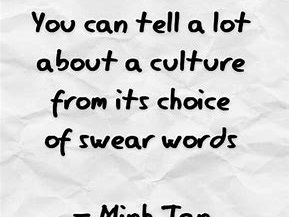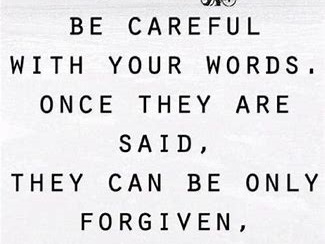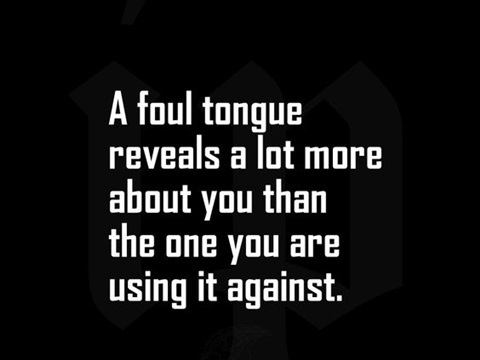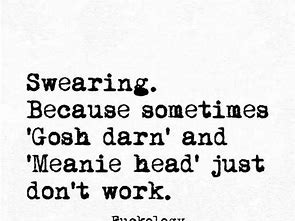What the fudge?
WARNING: The following contains naughty words.
In truth, there are days I could easily compete with Gordon Ramsay in swearing stakes and can swear with the best of them, sometimes even disgusting myself with the array of vulgarity that without warning leaves my mouth.
But why do we universally find the need to swear?
It is true that swear words serve many different functions in different social contexts, they express annoyance, aggression, and insult in addition on the reverse being solidarity and friendliness. As for Gordy, this industrial-strength foul mouth chef managed an impressive, but shocking 243 times in one show deemed to be simply demonstrating his passion and frustration. But is such an excessive outburst necessary, healthy, or plain uncomfortable and unnecessary?
This is not to say that I couldn’t swear 243 times should the need ever arise especially being well acquainted with a variety of the more familiar words and having added to my vast selection of expletives over the years (let’s face it most swear words are overused and boring as we tend to rely on sad metaphors for sex and going to the toilet when we want to insult someone). All enabling me to express and vent my emotions more effectively than some, but what would cause me to have such a cursing meltdown – surely not the state of someone’s kitchen? However, even in moderation there can be absolutely no confusion or greyness for the recipient when my mouth becomes potty and the f bombs begin to drop.
The English language contains an alphabet soup of swear words making it simply perfect for those of a sweary disposition who can draw upon the A-word, the B-word, the C-word, the F-word, the S-word, the W-word and many more. Swearing continues to evolve enabling the utilisation of new and trendy ways to insult others or sum up the situation by calling upon those bad words or little-known sophisticated words which are much better to use that have been around for centuries and are guaranteed to introduce new shock value.
But swearing is nothing new, it has been around for donkeys and people have been swearing for centuries. Some words exhausts themselves losing their punch like “Oh my God” which has declined in power as have other profanities such as “hell”, “damn” and “goddam”. They are replaced by new words, but the old swear words such as “f***” and “s***” have been around for almost 1,000 years and are still powerful. The beauty about language is that its organic and it grows what it needs and kills off what is obsolete enabling curse words to evolve over time.
The use of F*** as an expletive and C*** as a term of abuse date only from the early twentieth century. F*** was first recorded as a verb in 1528 and as a noun in 1663. C*** is considerably earlier, the oldest citation being the name of the street in London once known as Gropecuntelane, a name that reflected the fact that sex workers had congregated there centuries earlier as well as first appearing in the Oxford English Dictionary in 1230.
Therefore, no surprises that as a population at any age in any environment we swear!
For me there are certain triggers which cause cathartic swearing or spontaneous swearing and depending on the situation I am like a Tourette’s sufferer. But I am not alone! Driving and road rage are probably the most common activities for activating unrehearsed verbal insults consisting of a surprising range of bad and foul language. What else? Rude people, people who don’t pick up their dog poo, queues, getting into the wrong queue, stubbing my toe, forgetting that I have eaten my last doughnut; the list is exhaustive and there will be one for every individual on this earth!
At the point of swearing, in many cases, it allows the venting of one’s emotions conveying emotional information about one’s state of mind to others, no other language is needed!
However, I also recognise there is a time and place for such profanities to be used and it’s important to consider when, where and how you swear as it all matters just as much as which linguistic grenade you toss.
So, why do we do it?
Perhaps nowadays swear words hold less of a taboo making it not uncommon for you to hear the F-bomb dropped multiple times during a working day. However, there are particularly good reasons why swearing should be kept to a minimum in the workplace given the average person swears 14 times a day, a figure, probably a little distorted for some as some employees hear expletives more than 25 times a day, with the F-word being the most popular (what we lack in imagination, we make up in numbers!).
Personally I would challenge the above having worked with others who spent their day swearing and cursing others inappropriately and unprofessionally preferring the C-word and proving that when you work in a fishbowl surrounded by other cussers, sometimes people forget that foul language might actually, you know, offend people!
This is something I never take for granted and therefore refrain from swearing in the workplace or within a professional capacity.It must be recognised that swearing has its dark side. It can be used to bully people, intimidate people, upset people and it appears for those who swear at work regularly they know to censor themselves in certain crowds.
Carpet bombing your workplace with profanity will not get you a promotion, but fitting in at the workplace helps and in certain contexts, swearing is a way to connect. This might also suggest a broader problem with swearing. If it serves to consolidate the bonds in one group, is it to the exclusion of others? And if so, could it play a part in making the workplace more hostile?
Swearing is also a self-perpetuating phenomenon; the more someone in a group swears, the more others follow suit and soon the air if full of F's, B's, C's and all the other unmentionables.
A negative attitude can be contagious, creating a less pleasant working environment and its effect on the working environment becomes a genuine issue.
If you have sensitive ears you may want to avoid accepting a position in the health care industry, where 64% of employees admit to swearing in the workplace and 45% doing so on a regular or daily basis. The next rudest workplace is finance, where 62% swear in the office, followed by 61% of professional services employees, 59% of tech workers, 53% of government staff, and 48% of those who work in education.
Women are also more likely to report dropping f-bombs at the office, with 60% admitting to swearing at work, compared with 55% of men. However, men who do use profanity around the office tend to do so at a higher frequency than their female colleagues.
This begs the question should people swear in the workplace? Should we accept vulgar language at work?
81% of employers believe swearing at work brings an employee’s professionalism into question and even though some research show swearing has certain advantages, does it make you simply look stupid and unprofessional?
As much as it can make a person feel better and be a way of showing that sometimes polite vocabulary is not sufficient to express our frustration, will it earn any respect?
Without doubt workplace culture determines whether swearing is allowed or tolerated, but it can be difficult to clearly define what is acceptable and when disciplinary action is required. A common sense approach should minimise any issues, as there is a big difference between general swearing and letting off steam frustrated over work issues or with work pressures and deadlines compared with it being part of a physical or verbal attack, creating an aggressive environment, making people feel uncomfortable or being excessively obscene.
When swearing is part of a verbal or physical attack on a colleague, then it can be a valid reason to disciplinary action which could result in an employee’s termination.
Even though there are working practices and legal standards in place, most workplaces today are not concerned about offending tender ears. They are interested in creating a harmonious and productive working environments and employment tribunal cases that involve swearing are usually about something more serious, like bullying or harassment.
In general, most employers think profanity is unprofessional, feeling it shows immaturity, a lack of control and can even make the employee appear less intelligent.
People who continually swear can appear they are out of control and after a while they become predictable and in the long term become largely ignored or disregarded. If a person resorts to swearing at others to make a point or win an argument, it means they have already lost control of the situation and themselves.
Even though swearing may seem harmless, when someone resorts to continuous swearing, especially at others, the workplace will eventually disintegrate and whilst shouting profanities and hurling expletives at people may make someone feel better for a few fleeting moments, it can also be totally destructive and counter-productive and is a highly unsettling experience for everyone else. Excessive swearing could be a pointer to a lack of confidence or ability and it may be a habit which also acts as a coping mechanism.
Sometimes, a well-directed swear word has been known to create a positive response demonstrating the importance of an issue that requires a passionate response.
However, frequency and overuse will reduce status and diminish any power to command respect from others. The fact is, swearing too often simply erodes credibility. Therefore it must be remembered that swearing is a power language, a parallel vocabulary packed with emotion and social force, but its effects depend heavily on context: one person’s everyday expletive is another’s strict taboo.
If in doubt, the golden rule is refrain from swearing at work, in front of children, whilst on the company phone (most calls are recorded) at customers, patients or during an interview. Swearing at an actual human has its risks, repercussions, and consequences especially professionally.
All expectations on behaviour and what is not acceptable in the workplace should be outlined in every company’s code of conduct and introduced in employee inductions and throughout their employment providing a consistent message. If anyone does take it too far, a quiet word to explain how some people could find it offensive or make them uncomfortable usually has the desired effect remembering what context was it used and who the audience were. It is imperative that management set the tone for what is acceptable and ultimately lead by example.
Research has also shown there are many reasons why people might choose to pepper their language with colourful curse words, and profanity. Typically, a social swear word originates as one of the 'bad' words but becomes conventionalised in a recognisably social form. Using swear words as loose intensifiers contributes to the easy-going, imprecise nature of informal talk among in-group members and swearing hasn’t stopped every potty-mouth’s career progress. To swear with caution or after thinking it through can make a more persuasive stance and get people listening and things moving.
Is it a leadership tool? If it is seen that way, then it should never be a substitute for someone being good at their job. But some research suggests it might help in a roundabout sort of way and not all swearing is bad as the use of foul language is not necessarily always a bad thing for morale or teambuilding. Cursing also has its advantages, as it allows people to let off steam in an acceptable way.
It can also give us the extra energy to endure pain, as when you swear you set off the fight-or-flight response and one of the components of the fight-or-flight response is called stress-induced analgesia, meaning you become less sensitive to pain.
But rather than just keeping a lid on your anger, why not try and manage your swearing, what makes you swear and actively calm down. Take a breathing or meditation course and analyse why you are always blowing your top or why not indulge yourself in a little Rage Yoga which adopts the quiet, zen-like environment albeit an unconventional yoga class as it encourages swearing and shouting between poses combining stretching, positional exercises and bad humour but not forgetting the goal of attaining good health. Melding humour, serenity and swearing could offer a new pathway to personal peace and mindfulness and help us cope with the stress of work and day-to-day life!
If you do find yourself swearing why not try some more sophisticated words or perhaps try completely different words that may make you automatically smile and instantly calm down as who actually wants to work with a person who spends their time effing and jeffing – maybe its time to move on to more and new professional pastures?
From Greek, Latin and Old English, with a bit of Shakespeare thrown in, there are different, more imaginative and even sophisticated words but are still actually very insulting.
There are also a number of words we can use instead to make swearing a little bit more fun and more acceptable ...
Ninnyhammer
A ninny hammer is fool or a silly person, sometimes shortened to ninny.
Coccydynia
This one literally means a pain in the butt. It’s actually a real medical term for a pain in the coccyx or tailbone.
Quidnunc
It means a person who wants to know all the latest news or gossip. In other words, a busybody or nosey parker. It comes from the Latin quid nunc meaning ‘what now?’
Fopdoodle
You probably know someone who can sometimes be a bit dim. A fopdoodle is the perfect insult of them as it means a stupid or insignificant person
Ructabunde
If there is someone in your life that likes the sound of their voice a little too much, this might be the perfect way to insult them. It means a gasbag or someone full of hot air. From the Latin ructus (belch) and abundus (abundant).
Zounderkite
A Victorian word for the kind of bumbling idiot that will end up making an unbelievably stupid mistake.
Morosoph
Some people may be brainy, but have no common sense. This insult describes them perfectly. It means a learned fool. From Greek moros (stupid) and Sophos (wise).
or perhaps some of these may hit the spot to replace the normal S***, F*** or C***!
Holy shitake mushroom!
Son of rum puncher
Fudge nuggets!
Cheese and rice!
Shut the front door!
Fish paste!
Fraggle rock!
William Shatner!









